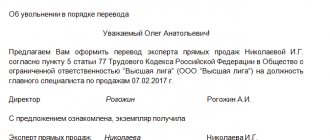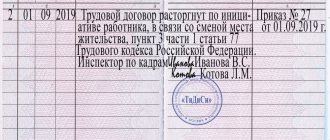Grounds for issuing a job offer
Any person who has passed the selection process and meets the employer's criteria in Europe and America receives a job offer. This is the company’s guarantee to hire the applicant. The document specifies the working conditions for the specified position or profession.
As a rule, an employer offers a job offer after several interviews, after making sure of the applicant’s qualifications. Preliminary communication with the HR department, immediate superior and head of the company does not always give an idea of working conditions. In an oral conversation, interlocutors may misunderstand each other.
Providing official paper eliminates misunderstandings at the preparatory stage of applying for a job. The employer's obligations enable the future employee to begin the dismissal procedure from his previous place without worrying about the future.
Main functions and purpose of the document
As a rule, by the time a job offer is sent, the employer and the future employee have undergone several interviews and have an idea of the nature of future employment.
However, there may be several applicants, which is why only the candidate who meets all the criteria receives a job offer.
Thus, this letter can be called a kind of notification, which is only informational in nature and invites you to take up a position.
Moreover, in addition to the invitation, this document also has other functions, in particular:
- the prestige that the company thus shows, bringing itself closer to Western analogues of reliability accepted abroad;
- a brief notification to the employee about some conditions for future cooperation (the same amount of remuneration);
- clarification of a number of aspects of the work process to prevent misunderstandings on the part of the new employee.
Contents of job offer
A letter with a job offer is drawn up by the company's HR service in consultation with management. It is sent to the applicant by mail or email. Information about the future employment relationship is less detailed than in a bilateral contract. Typically a job offer contains the following information:
- the name of the position offered to the applicant;
- composition of labor duties;
- monthly remuneration amount;
- the procedure for calculating bonuses;
- conditions of the probationary period, if any.
Some of the points included in the offer are transferred unchanged to the employment contract. Some provisions are clarified and spelled out in more detail. At the stage of signing a job offer, the applicant can clarify unclear details of employment, as well as achieve improved conditions.
Let's say the offer is accepted. What to do next?
Taking your first steps in a new company, surrounded by strangers, and even from home, is a frightening prospect, but not hopeless. The key to accepting the current reality is that thousands of people are now in the same situation, and a significant percentage of these people are employers.
Your potential manager is going through this for the first time and is also trying to adapt to unusual conditions and learning to work remotely when there is a family, children, and animals at home.
Companies are sympathetic to the doubts of professionals when moving to a new job during a crisis. In my practice, employers tried their best to facilitate processes from an organizational point of view. For example, we sent work laptops, organized the signing of an employment contract using electronic signatures, and much more.
There have also been cases when, due to a crisis situation abroad, companies with headquarters in Europe waited more than a month for the final confirmation of an offer - then employers regularly contacted the candidate to maintain motivation and orient them on the situation.
Historical aspects
In European countries, a job offer has official status. The employer is obliged to employ a citizen who has received a job offer for the position or profession specified in it within the specified time frame. The document serves as the basis for issuing a work visa, residence permit and other necessary documents to foreign workers by the migration department.
In Russian realities, the job offer has taken root thanks to the activities of foreign companies that use the companies’ HR standards when hiring Russians. Since well-known foreign corporations created offers on the labor market, the job offer created a certain image effect.
Russian companies, positioning themselves as reputable and reliable, began to use the document to hire top managers and employees with a significant amount of knowledge and practical skills.
What does an invitation to work in Canada give?
If you are lucky enough to receive a work invitation (details on how to find a job in Canada) that meets the requirements (more on this below), then you can count on:
- additional 15 points for participation in the Federal Skilled Worker program;
- compliance with the requirements of the Federal Skilled Trades program, if the job offer is in a specific specialty (more details at the link);
- additional 50 or 200 CRS points (last 2 lines of the table) when in the Express Entry pool of candidates;
- compliance with the requirements of some provincial programs that require a work invitation.
Legal basis
The relatively short history of the job offer in Russia did not have time to form the legal basis for its use in labor relations. Often a job offer is considered as an analogue of a preliminary contract or the issuance of an acceptance or offer. However, these instruments are elements of civil legislation and are not applied in labor law.
According to the Labor Code of the Russian Federation, labor relations between a citizen and the organization that employs him begin with the signing of an employment contract. Thus, in the Russian Federation, a job offer is a protocol of intent that has no legal force. Any party can refuse the conditions specified in the preliminary agreement.
A change of employer through a transfer can guarantee employment for a promising employee. To complete the transfer, you must obtain the consent of the management of both companies.
In what form can it be sent?
An official invitation to work, of course, can be expressed both in writing and orally, but a verbal promise does not guarantee one hundred percent employment and can be violated by the employer himself.
That is why, in order to preserve the prestige of the company, as well as the employee’s confidence in subsequent employment, a job offer is issued only in writing on the institution’s letterhead with the inclusion of some fairly clear conditions that determine the nature of future interaction between the parties.
What is certification? Details are on our website. What regulates the provisions on mentoring? Find out here.
Benefits from the job offer
Despite the lack of a regulatory framework for a job offer, drawing up a preliminary document on the conditions of employment has a number of advantages that allow you to effectively use this tool.
A company that values its image fulfills the terms of the agreement, despite its legal nullity. Job offers are similarly treated by job seekers who care about their reputation. The job applicant reacts positively to the presence of the document. This is especially important if the candidate works in another place.
A written agreement consolidates the agreements reached during the preliminary conversation. This will minimize possible conflicts in the future. The employer receives a guarantee that the candidate has familiarized himself with the working conditions, which eliminates problems when concluding a contract.
How to make a job offer?
Since there is no regulatory framework regulating the use of job offers, the employer independently determines the form of the document. When writing a proposal, the applicant should adhere to standard office procedures.
To maintain the image component, it is better to write the letter on the organization’s letterhead. As a rule, it contains all the necessary information about the employer. The document may contain a confidentiality notice.
In the upper right corner there is information about the recipient of the job offer. It is customary to use the address Mr. or Madam. Then in the center of the page you should write the title of the document - “Job Offer”.
Body of the letter
The main part of the invitation specifies working conditions, functional responsibilities, subordination, and salary. You can specify the work and rest schedule. The text of the letter must contain the employer's expressed desire to hire the employee. The document indicates the expected timing of the employee's departure to a new place.
The company's management independently determines the need for the applicant to sign a job offer or receive a response in another way.
On behalf of the company, the letter is signed by the manager or immediate supervisor of the future employee. If the invitation is addressed to candidates for positions of top managers, the signature is signed by the general director of the enterprise.
Sample of a job invitation
Dear Andrey Petrovich!
Standard LLC invites you to fill the vacant position of “sales representative” and begin work on August 1, 2017.
Your responsibilities include:
1) providing advice to clients;
2) work with the client base that the company has already developed;
3) compiling a new customer base;
4) reporting on accounts receivable.
Your job responsibilities will be outlined in detail in your employment contract and job description.
As we discussed during the interview, your salary will be 75,000 rubles. per month. Our company also has a bonus system, which you will be offered to familiarize yourself with in the HR department when concluding an employment contract. Guarantees and compensation to employees of Standard LLC are provided in accordance with the labor legislation of the Russian Federation.
We invite you to apply for a job in the HR department of Standard LLC on July 20, 2020 at the address: Murmansk, st. Lenina, 15, building 1, 1st floor, office No. 105. The department works from 8.00-17.00, lunch break from 12.00-13.00.
HR specialist Kravchenko Yu.A. Kravchenko
Legal aspects of the concept of job offer: what job seekers need to know
Job offer, a concept common in the West, is gradually becoming more and more popular in Russia. What is its meaning? In foreign labor law, a job offer is an employer’s official offer of employment to an employee, which specifies all the essential terms of the employment contract that will be concluded in the future: position, salary, conditions, working hours, guarantees, benefits, etc.
The mere sending of a job offer to a specific person already implies that the candidate suits the employer in all respects and does not require any other evidence of professional suitability on the part of the employee (for example, passing tests, participating in a competition for a vacant position among other applicants, etc. .) Initially, in Western labor law, a job offer is considered as a convenient tool for luring a highly qualified employee from one company to another, often from a competing company, offering him more attractive working conditions.
Russian labor legislation does not contain the concept of a job offer, and despite the increasingly expanding scope of its application, it does not consider a job offer as a document with legal force. The absence of legal norms regulating the relationship that arises between a potential employee and an employer when concluding a job offer becomes the cause of conflict situations. The cause of conflicts may be the employer’s refusal to subsequently employ the person who received the job offer, or the employer’s unilateral change in the terms of his offer when concluding an employment contract. What should the employee do in this case and is there an opportunity to defend his rights to conclude an employment contract on the terms contained in the job offer?
a job offer or not ?
Let's return to the history of the emergence of job offers in Russia. Foreign companies that came to our country in the 90s were the first to use preliminary job offers in their practice. last century and began to transfer their recruiting culture and Western traditions of formalizing labor relations with employees to Russian realities. Using proven and well-known principles and methods for selecting and hiring personnel, companies with foreign capital, without any justification, began to use the norms of their national law when registering labor relations in Russia.
The formation of a job offer is usually preceded by an interview with the candidate, an assessment of his professional abilities during a personal meeting with the employer and representatives of the HR service. Considering a job offer as an official invitation to a vacant position, the employee quits his previous job, after which he bears all the risks associated with the possibility of a new employer refusing him employment on pre-agreed conditions. During the time that passes between the formation of a job offer and dismissal from a previous job, a new employer may find a more suitable candidate for a vacant position, or the vacancy may lose its relevance. Conditions within the company may also change, which will not allow it to conclude an employment contract with the candidate on previously agreed terms. Unfortunately, Russian legislation in this case does not protect the rights of the employee in any way, forcing him to bear all the risks associated with employment with a new employer.
Will a written contract protect?
Considering the signing of a job offer as an official formalization of an invitation to work, the parties do not take into account the fact that putting a document not provided for by the labor legislation of the Russian Federation in writing does not give it any legal force. On the one hand, an agreement containing the essential terms of an employment agreement, from the standpoint of Article 429 of the Civil Code of the Russian Federation, can be considered as the conclusion of a preliminary agreement; on the other hand, one should not forget about the presence in the same Civil Code of a rule on the non-application of civil legislation to labor relations. The Labor Code is unambiguous - according to Article 16 of the Labor Code of the Russian Federation, labor relations, as a general rule, arise from the moment the employment contract is concluded. An exception is the actual access of a person to work, which can be recognized as the conclusion of an employment contract before the signing of a written bilateral document between the employee and the employer.
a job offer is refused ?
In practice, most cases of refusal to fulfill a job offer come from the employer, but there are also cases of employee refusal to fulfill the terms of the preliminary agreement. This raises two problems:
- how to make the conclusion of an employment contract on the terms set out in the job offer mandatory for both the employee and the employer;
- and how to compensate the person who signed the job offer for losses caused by the refusal of the other party to conclude an employment contract on pre-agreed conditions.
Currently, unfortunately, there is no legal mechanism to solve these problems. Judicial practice for resolving such disputes has also not yet been formed. One of the reasons is the lack of tradition among our citizens to defend their labor rights in court. Having been refused a job or faced with employers not fulfilling their obligations, our fellow citizens, unlike Americans and Western Europeans, prefer not to file lawsuits in court, but to solve their problems on their own. Isolated cases of consideration of such disputes occur in the courts of Moscow and St. Petersburg, but it is not yet possible to talk about the emergence of any law enforcement practice in these matters. At the same time, in Western countries (especially in the USA) there are judicial precedents in which employers who violated the terms of a job offer were subject to serious fines and damages to injured employees, the amount of which exceeded several hundred thousand dollars.
Currently, we can say that the only tool for forcing the parties who signed a job offer to fulfill the conditions contained in it is the image component of the relationship. As a rule, the conclusion of a job offer in their recruiting activities is practiced by well-known, reputable foreign companies or companies with a share of foreign capital in the authorized capital, while the job offer itself is regarded as an official document of the company, subject to execution regardless of whether its force is supported by legal norms. In addition, a job offer is often used precisely as a tool to lure away especially valuable personnel for the company, so ultimately, failure to fulfill one’s obligations in this case can seriously undermine the company’s image in the professional environment. The consequences of such losses will have a negative impact in other areas of the company’s activities, not limited to labor relations. An employee who refuses to fulfill a job offer may face similar problems of losing the image of a serious, highly qualified specialist in his field in the future.
Workers should also not forget that the Labor Code of the Russian Federation has a mechanism for protecting their rights when moving to work from one employer to another. Clause five of part 1 of Article 77 of the Labor Code provides for the procedure for terminating an employment contract with an employee in connection with his transfer to work for another employer. A written request from a new employer to dismiss an employee by way of transfer indicating his new position is regarded as an official invitation to work and deprives him of the right to refuse to conclude an employment contract with the employee within a month after sending such an invitation in accordance with Article 64 of the Labor Code of the Russian Federation. If there is agreement to dismiss an employee by transfer to another employer of all three parties to these legal relations, such an invitation can be regarded as a “safety net” issued in addition to the job offer. It will not be able to guarantee that the new employer will fulfill all preliminary agreements on working conditions, but it will at least be able to protect the employee from unjustified refusal to conclude an employment contract at the new workplace.
However, given that in reality it is difficult for the employee, new and previous employer to agree on all the conditions of such a transfer, paragraph 5 of Article 77 of the Labor Code is used quite rarely in practice. A job offer, despite its lack of legal norms, is an effective means of recording all the essential conditions for the employee’s transfer to another employer. The presence of a document signed by both parties subsequently helps to eliminate any misunderstanding between them, and if the employee and the employer value their reputation in the professional environment, then they are mutually interested in fulfilling their obligations.
The article for hrdocs.ru was prepared by Iren Sergeeva
What to do if one of the parties does not comply with the terms of the preliminary agreement?
Situations when working conditions do not coincide with those stated are not uncommon. A subsequent refusal by the employer to conclude an employment contract is possible. Judicial practice to protect the rights of potential employees has not been formed. Citizens do not file statements in court due to reputational risks.
According to experts, the prospects for winning are practically negligible. The solution may be to give the job offer legal force. The employer has a similar situation if a potential employee refuses to sign an employment contract or fails to show up for work on time.
Increasing the commitment of the parties is possible when recruiting personnel through professional recruiters, but they will not give a 100% guarantee of compliance with the terms of the job offer.
The Avantage company offers outsourcing of HR administration to companies with any number of employees in St. Petersburg. The service includes the selection of employees, preparation of personnel documentation, consultations on labor law, interaction with accounting and other customer structures.
Don't cut from the shoulder
If you went to an interview where the recruiter mentioned a possible desire to invite you to work, do not rush to write a letter of resignation. An offer from a headhunter may be a kind of competitive intelligence, a desire to assess the situation on the market, or simply words spoken carelessly. Moreover, if this was only the first interview and you are facing a second, more serious one, in which you may not like your boss, your working hours will not suit you, or you will simply understand that you do not want to change anything.












